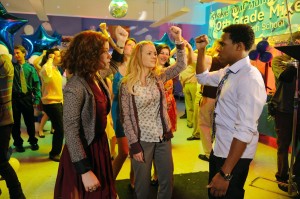In case you haven’t heard of ABC’s “Suburgatory,” all you need to know is that it writes suburbia the bitchiest love letter of all time.
“Suburgatory” is all about Tessa and her father George (Jeremy Sisto)’s attempts to understand the world of bleach-blonde hair, conformity and country clubs — suburbia — after moving there from New York City.
The Feb. 22 episode, “Fire with Fire,” first greets the viewer with zooming in on Earth, revealing three fathers pushing their three respective children on a swing set.
From a bird’s eye view, the fathers and their children look more or less identical. The speed of the zoom, the camera angle and the repetition creates a brief, creepy moment — the kind that makes you wonder if you’ve accidentally started watching a science fiction show instead of an ABC comedy. Narration from teenage protagonist Tessa Altman (Jane Levy) begins seconds later, and the mystery mostly disappears. Kind of.
“Fire with Fire” debuted fifteen episodes into the series, so George and Tessa had already had some time to adjust. The episode revolves around trends (read: conformity) in suburbia. This may sound pretty unexciting — isn’t suburbia all about fitting in? — until the show reveals that Chatswin’s latest trend is divorce.
Dallas Royce (Cheryl Hines), neighbor and George’s potential love interest, decided to leave her husband in the previous episode, “The Body.” Suddenly, snobby Jill Werner (Gillian Vigman) decides a trial separation from her husband Noah (Alan Tudyk), one of George’s best friends on the show, wouldn’t be such a bad idea.
The teenager’s plot lines of the episode cleverly parallels the adult’s stories, and yet also seems straight out of “Mean Girls,” (2004) directed by Mark Waters. Bratty Dalia Royce (Carly Chaikin), Dallas’ daughter, decides to steal Tessa’s friend Lisa (Allie Grant) because Tessa dated Dalia’s crush, Scott Strauss. Lisa, who has been snubbed by Dalia all of her life, goes eagerly. It’s terrifying to watch Dalia turn Lisa into her clone — and the transformation affects more than just her appearance. “Now your eyelashes aren’t so stumpy,” Dalia tells her. “Thanks, bitch,” Lisa retorts.
Makeovers seem par for the course in sitcoms, but they work especially well in “Suburgatory,” where superficiality is all-important. Series creator Emily Kapnek makes no efforts to expose suburbia’s seedy underbelly (Showtime’s “Weeds” has that covered) or show how “mean girls” destroy each other’s lives. Rather, Dalia’s plan is easily foiled, and the divorce trend begins and ends with Dallas.
The conflict has been completely resolved by the end of the show’s twenty-one minutes. In the end, “Suburgatory” isn’t threatening or haunting. Mostly, it’s incredibly intelligent and witty.
An entire novel could easily be written on this show’s cleverness, but here are the cliffnotes: The show creates an intriguing, funny premise within a scene, then makes it wittier.
A perfect example occurs when Dallas’ shiny new boy toy, Yoni, (Wilmer Valderrama) and George come head-to-head. Dallas and George have a flirty relationship filled with sexual tension, so George understandably feels threatened by Yoni’s youth, body and sexy South American accent. Yoni and Dallas, matching in garish white outfits, make out in front of George. Off-screen we hear Dallas say, “Yoni, that is too much tongue!” Yoni responds, “Not in my country.”
Cue the testosterone wars.
George and Yoni trade hilarious barb after hilarious barb until Dallas tells Yoni to leave the room so she can yell at George on her own. Yoni tries to take Dallas’ pet dog with him; George tells the dog to stay. Western movie showdown music plays subtly in the background.
The dog listens to George, and Yoni turns to leave. But, before the camera cuts away, Yoni gets the last word with the huffy comment “I didn’t have a white leash anyways.” Suddenly, Yoni and Dallas’ matching outfits make more and less sense simultaneously. Yoni’s apparent obsession with the color white is funny and subtle, and the line rewards those observant enough to have noticed the outfits from the start.
But wit alone couldn’t make “Suburgatory” addicting. Rather it’s that “bitchy love letter” quality — even at Kapne’s sharpest and most critical moments, her characters have clear and relatable motivation for their often-petty actions. (Let it be noted, as suggested by the episode title, that Tessa and George are not above petty counteraction themselves) Even friend-stealing Dalia suggests that she’s acting out because she’s suffering from her parents’ divorce. This tiny moment brings everything to a head — suddenly viewers break through the bright “Suburgatory” surface and see that shallow conformity, when it pertains to things like divorce, can have real consequences. We feel chastised for our dislike of Dalia. We are forced to step back and consider her as a deeper character.
But “Suburgatory” is a satirical comedy, and a witty one at that. Needless to say, the touchy-feely moment doesn’t last long. Tessa offers Dalia her sympathies, and Dalia begins a hilarious, extended rant about how Tessa will be much more miserable than she ever will. It’s a wonderful scene, but I don’t want to spoil it anymore here.
Go watch “Suburgatory” — you won’t regret it.
Cohen is a member of the class of 2012.



